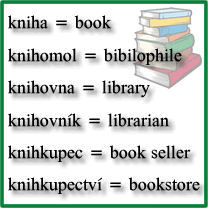
One of the Czech words I learnt this week is knihkupectví [ˈkɲɪxkupɛt͡stviː], which means bookstore / bookshop.
It’s one of a number of words that come from kniha (book), including :
- knihkupec – book seller
- knihovna – library, bookcase
- knihovník – librarian
- knihomol – bibliophile, book lover, bookworm
- knížka / knížečka – diminutives of book
- knižní záložka – bookmark
The word kniha comes from the Proto-Slavic *kъniga (book), but beyond that its origins are shrouded in the mists of time. More details.
In Czech it’s easy to see the connection between these words, which makes learning them easier. In English there are book-related words derived from Old English (book), Latin (library) and Greek (bibliophile).
In Welsh most book-related words share a common root:
- llyfr [ɬɨ̞vr / ɬɪvr̩] – book
- llyfygell – library
- llyfygellydd – librarian
- siop llyfrau – bookshop / bookstore
- llyfraf / llyfro / llyfru – to book, record, register, enrol
- llyfran – small book, booklet, pamphlet
- llyfreugar – fond of books
- llyfrgarwr – bibliophile, bookworm
- llyfrbryf – bookworm
- llyfrgaes – bookcase
- llyfrgaer – bookkish, studious
- llyfrnod – bookmark
- cyfriflyfr – ledger
- dyddlyfr – diary, daybook
- gwerslyfr – textbook
- llawlyfr – handbook, manual
The word llyfr was borrowed from the Latin liber (book; the inner bark of a tree), which is also the root of the English word library, and words for book in many other European languages [source].
Latvian has the Greek-derived grāmata.